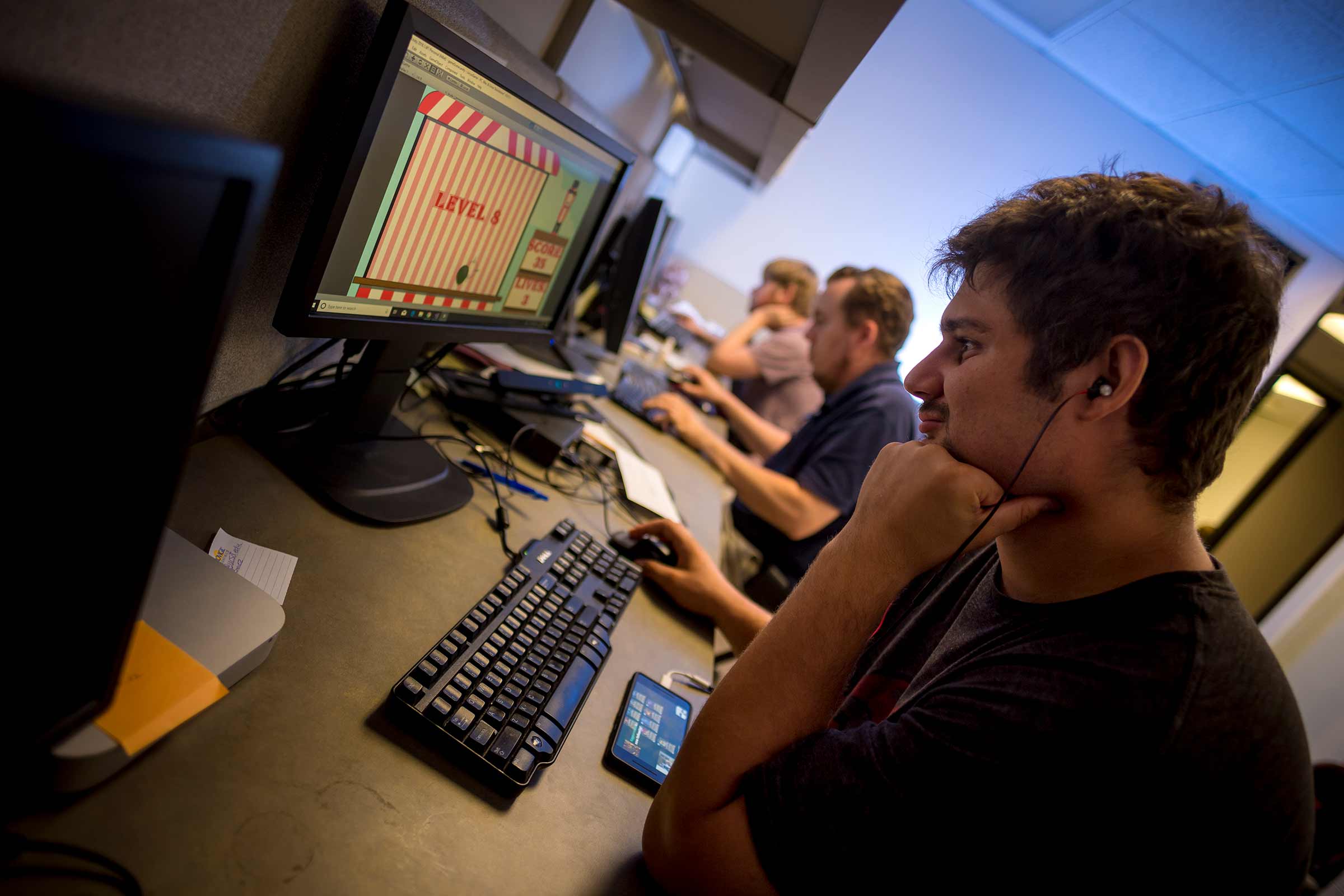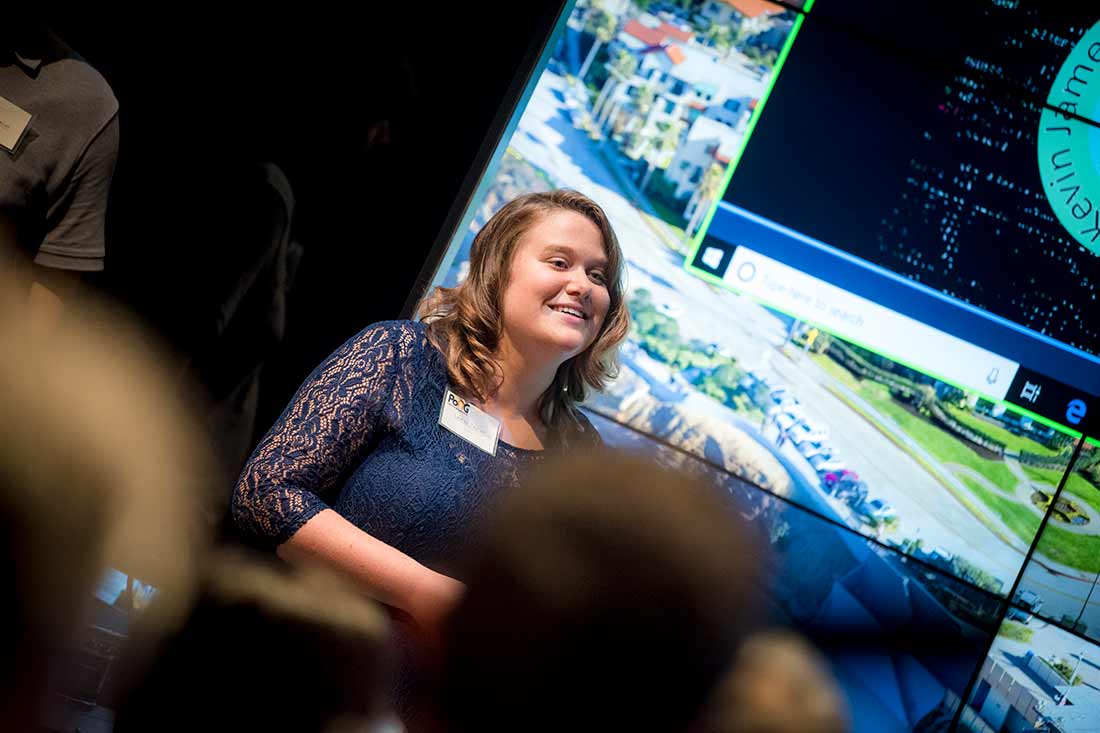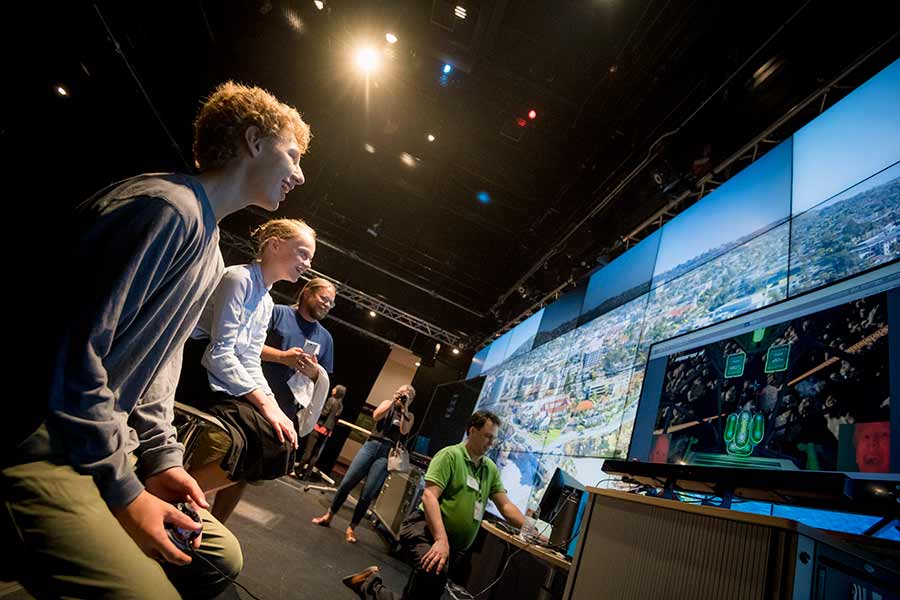By:
Published Date
Tapping Untapped Talent
Internship program taps into the talents of autistic youth

A new internship program at UC San Diego empowers young adults—90 percent of whom are on the autism spectrum—to strengthen their technology and professional skills in preparation for a career. Photos by Erik Jepsen/UC San Diego Publications
She kept it a secret for most of her life, fearing she would be treated differently. But now, Lauren Taylor is more candid about being autistic. This summer, she was able to open up about her challenges and connect with those who have had similar experiences. Taylor, an incoming freshman, was one of 25 interns who took part in a new program at UC San Diego that taps into the talents of autistic youth to help develop video game therapies for those who have cognitive disorders.
“Many people don’t understand autism; there are a lot of stereotypes,” explained Taylor. “I didn’t really tell people I’m autistic. They may see my social deficits, but I never really acknowledge it. There’s many people in the internship program like me, so I’m able to be more open about my struggles, which is really good.”

For incoming UC San Diego freshman Lauren Taylor, the program has offered an opportunity to open up about being autistic and connect with those who have had similar experiences.
For those on the autism spectrum, getting hired for a job can be a daunting step, especially the interview process. Often, social anxiety and a preference for routine make it difficult for autistic people to communicate their skills and make big life transitions. UC San Diego neuroscientist Leanne Chukoskie recognized an opportunity to help local autistic young adults—an underrepresented population in the STEM field—build their social skills and professional resume.
With support from the San Diego Foundation and the Legler Benbough Foundation, she established a unique summer internship program through the Power of Neurogaming Center (PoNG) at UC San Diego’s Qualcomm Institute. For eight weeks, the interns—90 percent of whom are on the autism spectrum—worked collaboratively to design, code and project manage numerous video games that can serve as therapies for those with autism, dementia and other conditions.
“Oftentimes when you hear the word autism, the image that comes up is of a child, but this is a disorder that is lifelong,” said Chukoskie. “The goal of this program is to shine a light on this community, demonstrate that this is the tech talent companies have been missing. These people have a lot to give.”
Taylor echoed this belief, “People with autism can be successful, productive members of society. But we just need to be able to help them with accommodations and support so that they can live up to their full potential.”
Grouped in teams, the interns collaborated on “neurogames,” or video games that are intended to improve cognitive functions such as attention and balance. Using eye-tracking technology, balance boards and EEG (electroencephalogram) sensors, participants can physiologically connect to the game, playing with their eyes and learning to activate alpha brain waves to promote a sense of calm. These skills are crucial for those affected by autism and attention deficit disorder, and video games can be an engaging way to have fun while encouraging mastery.
Corey Pritts, an intern artist, led the design for a game that will help improve navigation and wayfinding skills for those with dementia. Similar to Pokémon Go, users are invited to travel to a series of flags that pop up on their smartphone, and a mascot helps them find their original location.
“It’s a win-win scenario” Pritts said on making art for the video games. “I’m doing what I like and it’s helping other people.”
In addition to developing transferable skills for a future career, the interns were paired with undergraduate students and recent graduates from UC San Diego and other local universities for one-on-one mentorship. Together, they worked on emotional intelligence and discussed the unwritten rules of a professional work environment, from giving constructive criticism to working collaboratively. The laboratory is considered to be a safe space for interns to practice, make mistakes, get feedback and learn.
Throughout the summer, camaraderie grew among the interns, who happily shared ideas and pitched in on multiple projects. Coding intern Seth Posner found working as a team to be enriching, “I enjoy the community we have here in this office. It has been really fun working together, talking about progress.”

At the end of the summer, interns had the chance to conduct an interactive showcase of their research and resulting video games to the campus and local community.
Coding intern Alex Buchanan led his team in creating a game called “Equilibrium” that was developed to improve balance. Using a balance board, similar to a Wii Fit board, the player would lean back and forth, collecting objects as they progress toward the end as quickly as possible.
“I decided to take part in the PoNG summer internship because I've always liked the idea of contributing to science and research in some way,” said Buchanan. “I really enjoyed learning how to work as a team to make a product that could be useful to someone. That gave me a good feeling to be able to accomplish.”
Although Chukoskie has invited young adults on the autism spectrum to work in her lab in the past, this is the first time she has been able to organize a full program to help build the confidence and skills of a community whose abilities and contributions can be overlooked.
“I really hope that this summer internship has provided workplace skills that are durable and help people not only find that next job, but really succeed once they are there,” she said. “That they understand a little bit more about interpersonal relations, working in teams and importantly, how to rock that first interview to get the job.”
Share This:
Stay in the Know
Keep up with all the latest from UC San Diego. Subscribe to the newsletter today.



